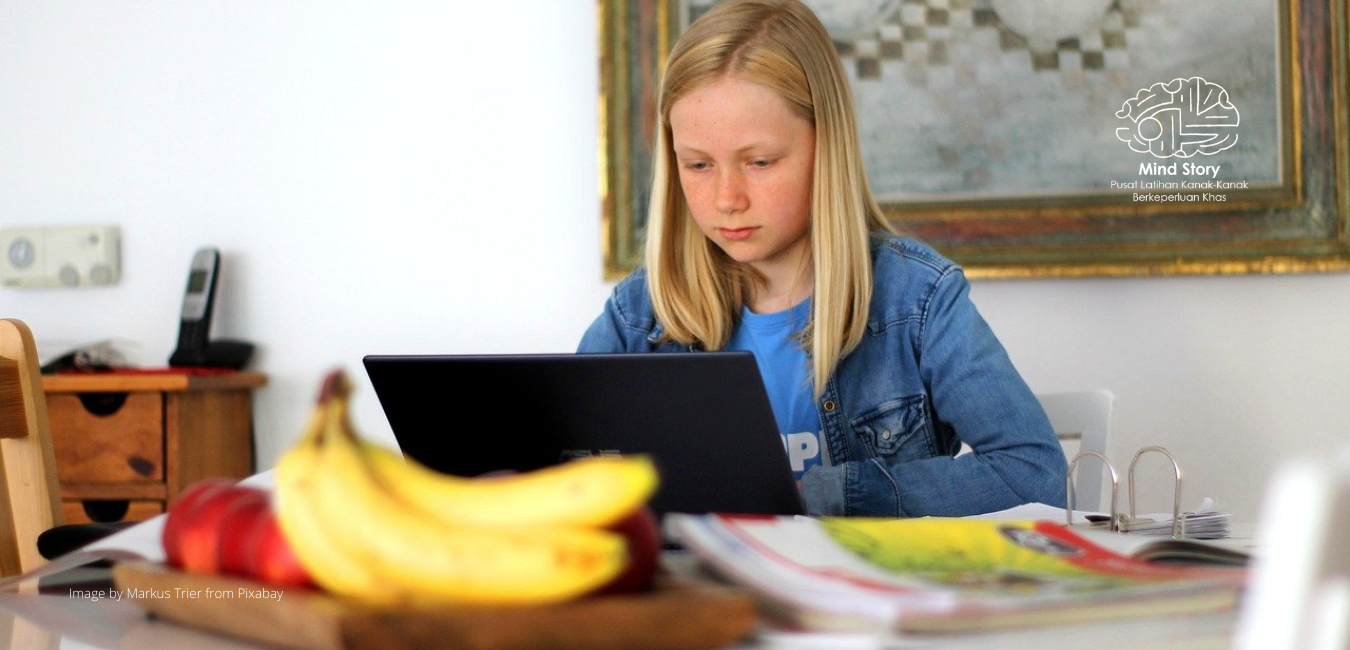
Online learning has taken the storm since pandemic started last year. Based on our online learning experience with our children with special needs, parents can set up their home for conducive online learning for your children. Looking into these guidelines, you will prepare you and your child for a wonderful journey on online learning.
Before Online Class Starts
Routine

Please speak to your child before class starts. This will prepare him / her to expect that classes will be conducted from home. Most children has their “formal learning” at school and not at home. They may need time to understand and getting used to learning from home.
Get your child ready for classes – have an early night the day before, waking up on time, have breakfast, change to school uniform. Use the same routine as how you have been getting your child ready when there was physical school. This will connect with your child’s body and prepare him / her for learning in “school”.
Space / Environment
Have a designated area where you can reduce distraction for your child while classes are running. Lighting, TV, radio or even smell coming from the kitchen can be a distraction. Speak to your child about sitting at the designated area and where to get the supplies like color pencils, paper, glue, scissors, etc.
Communicate with family members about designated hours to access the area and remind them of keeping TV volume low or switching on lightings. Everyone in the family plays a role in supporting your child for his / her online learning experience.
For children who may need reinforcer, prepare the reinforcer beforehand and have it nearby but not reachable or seen by your child.

Lesson of the Day
Find out from the teacher or therapist what is scheduled or lesson for the day and list of materials needed before class. Have the materials prepared and ready when the class starts. You can organize them in trays for different sessions for your child.
During online class

Put away your parent’s hat and be the teacher’s or therapist’s assistant during class. Observe and learn their tips and tricks when they are communicating with your child. Repeat the instructions (if needed) because internet connection can be crappy at times. Your child may have missed the instructions thus not responding to teacher or therapist.
You can take this opportunity to learn how to engage, communicate and work with your child. Observe changes in your child’s mood and challenges they face when completing tasks or the session. Allow teacher or therapist to lead any resistance and challenges during class. Follow teacher’s or therapist’s instruction and support your child when learning gets tough.
You child may not be able to complete the lessons or struggles with certain task such as cutting a straight line or coloring within lines. Give your child the autonomy to complete his or her lessons at their pace. Help your child only when teacher or therapist gives the green light.
After online class
Share your observation and concern with teacher or therapist. If sharing cannot be done immediately, make notes and questions to clarify. This is also a good time to share your other concerns in your daily routine such as getting your child out of bed. Teacher or therapist can include activities or lessons as part of their teaching plan.
Share what you know about your child with teacher or therapist. Certain noise, pictures or actions that may trigger your child. If there are changes in your child’s regular routine such as a visit from grandparent, or even bickering with sibling over who gets to eat the last muffin.
After the online classes, do take time to reward yourself. Do understand that online learning is still new to a lot of people – parents, children and teachers or therapists. Not only we need to deal with the technology, but also the change in controlled environment, routines and teaching pedagogy. Ultimately, it is crucial to know that you are on this journey as a team. It is an excellent opportunity to “invite” your child’s teacher or therapist to be at your home for them to understand and see your challenges (with your child with special needs) and have them support you in this journey.

Final note
Confidence comes from willingness to do new methods and being persistent until you see the results. This pandemic has given us the opportunity to learn from the professionals at our home, in our setting and environment. Supporting our children with special needs is not just sending them to school or therapy for them to learn the necessary skills. As parent, we need to learn skills where we can support our children by giving them appropriate and consistent approaches at home. Our children are spending more time at home than at school. Parents can support their growth and development and you will gain confidence working with your child as you are spending more time with them, too.